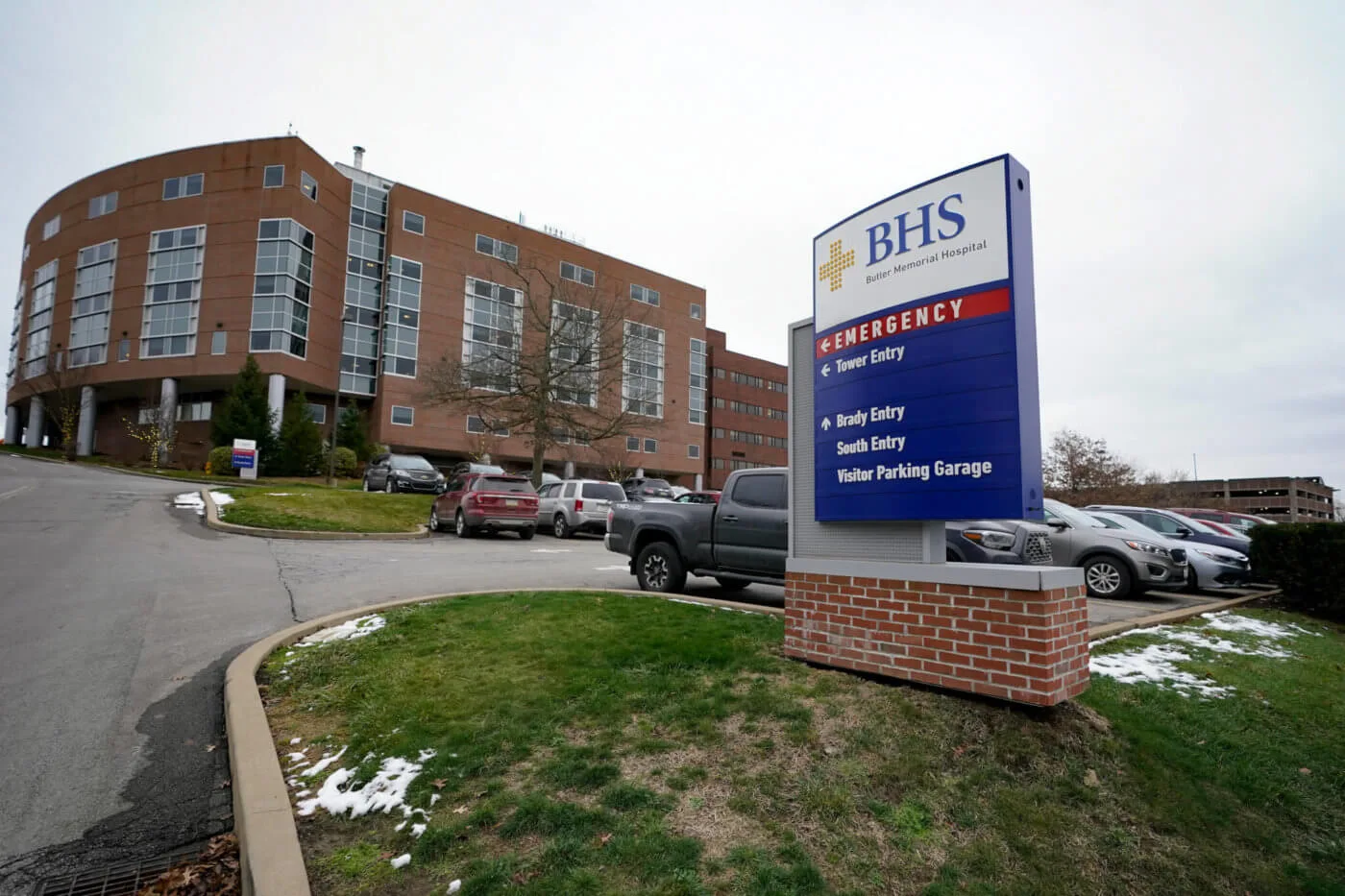
Signs mark the entrances and driveways to Butler Memorial Hospital, Friday, Dec. 4, 2020, in Butler, Pa. (AP Photo/Keith Srakocic)
COVID-19 caused a significant increase in mortality rates and cost of care across Pennsylvania from October 2019 to September 2020, according to a recent report. The results only included the first wave of COVID hospitalizations and did not include the biggest wave of cases that started in late 2020.
Pennsylvanians with COVID who also suffered from a common but serious medical condition, such as COPD, diabetes, or blood clots, were six times more likely to die, according to a recent report.
The cost of their hospitalization also doubled.
The Pennsylvania Health Care Cost Containment Council (PHC4) recently released its annual report that looked at mortality and readmission rates as well as average medical costs for Pennsylvanians with 14 common but serious medical conditions from October 2019 to September 2020. It covers the first wave of COVID hospitalizations in the state, but doesn’t include much of the biggest wave, which peaked in late 2020 and early 2021.
The 14 conditions include:
- Abnormal heartbeat
- Blood clot in lung
- Chest pain
- COPD
- Diabetes
- Heart attack (angioplasty/stent)
- Heart attack (medical management)
- Heart failure
- Intestinal obstruction
- Kidney and urinary tract infections
- Kidney failure (acute)
- Respiratory failure
- Sepsis
- Stroke
“Individuals who received the first two doses of the vaccine have significantly lower hospitalization rates and lower instances of mortality compared to those who have not been vaccinated,” said Dr. Debra Powell, chief of Infectious Diseases Division at Reading Hospital—Tower Health. “Reports have shown us that in Pennsylvania, 97% of deaths, 95% of hospitalizations, and 94% of COVID-19 cases were among those that have not been vaccinated.”
COVID Effect on Mortality Rates
The mortality rate for cases of the 14 conditions without a COVID diagnosis was 4%, as compared to 24.6% with COVID.
COVID greatly increased the mortality rate for some conditions, including:
- Heart attack (angioplasty/stent): 1.7% to 11.1%
- Heart attack (medical management): 7.1% to 15.4%
- Sepsis: 9.6% to 27.9%
- Stroke: 2.9% to 13.6%
“The COVID-19 vaccines are safe and effective, and obtaining the vaccine protects you, your family, and your community,” Powell said. “I would strongly encourage individuals to get the booster vaccine to continue to protect themselves from the COVID-19 virus. We have seen a decrease in a person’s antibody levels as time passes and we want to be sure we keep everyone safe and healthy and decrease the opportunity for the virus to mutate.”
COVID Effect on Hospitalization Charges and Admissions
The average hospitalization charge for a patient with COVID was $104,179 as compared to $53,578 without a COVID diagnosis.
The readmission rate for patients with COVID was 6% as compared to 17% without COVID. Some readmission rates did increase if COVID was present, including:
- COPD: 20.1% to 23.5%
- Heart attack (angioplasty/stent): 8.7% to 10%
- Intestinal obstruction: 13.3% to 17.4%
Non-COVID Rates
Without the inclusion of COVID cases, overall Pennsylvania hospitals saw a continued, years-long trend of statewide decreases in mortality and readmission rates. This is attributed to medical advancements and better caregiving, according to the report.
Statewide in-hospital mortality rates showed significant decreases for four of the conditions from 2015 to 2020—findings that translate to an estimated 1,205 lives saved.
Readmission rates fell in 11 of the conditions, suggesting an estimated 2,323 readmissions avoided, according to the report.
Politics

Biden announces tariffs on Chinese Steel while visiting United Steelworkers members
“I'm president because of you guys. I really am and I'm proud. As was mentioned earlier, I'm proud to be the most pro-union president in American...

Opinion: Is Reproductive Healthcare just a women’s issue?
In this op-ed, Pennsylvania resident Lynn Strauss discusses the Republican Party’s conflicting stance on reproductive healthcare policy and the...

2 top US gun parts makers agree to temporarily halt sales in Pennsylvania
Philadelphia filed suit against Polymer80 and JSD Supply last year, accusing the manufacturers of perpetuating gun violence by manufacturing ghost...
Local News

Conjoined twins from Berks County die at age 62
Conjoined twins Lori and George Schappell, who pursued separate careers, interests and relationships during lives that defied medical expectations,...

Railroad agrees to $600 million settlement for fiery Ohio derailment, residents fear it’s not enough
Norfolk Southern has agreed to pay $600 million in a class-action lawsuit settlement for a fiery train derailment in February 2023 in eastern Ohio,...






